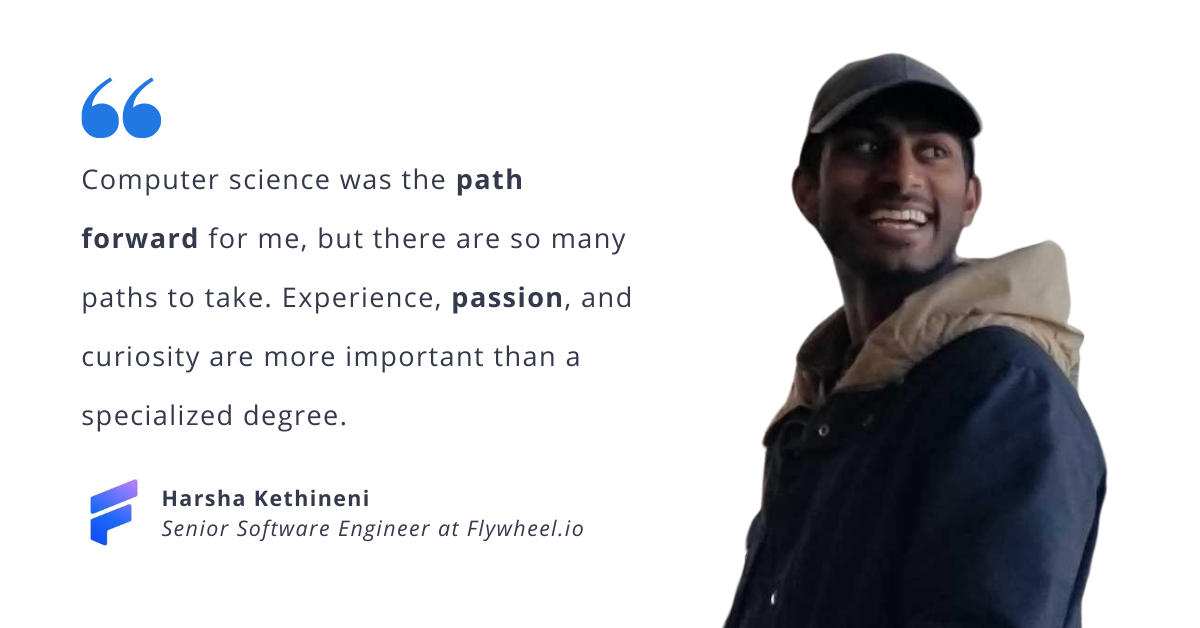Software development is in Harsha Kethineni’s blood. “Both of my parents are in the computer science field,” he says. “So when I was younger, they introduced me to programming.” By the time he was in middle school, he was creating his own text-based video games. “I liked learning different languages and different ways of how to program, and by the time I was in high school, I knew I wanted to go into a STEM field.”
And that’s exactly what he did. Today, Harsha is a senior software engineer at Flywheel, a biomedical research data platform. We sat down with him to learn about his journey from college student, to intern, to engineer. Keep reading to hear his advice to smooth the transition from school to industry.
Figuring Out Next Steps
Harsha knew that he wanted to focus on science and technology in his career, so he originally opted for a double major in physics and computer science. “I had always been interested in astrophysics and space, and I wanted to learn more about that,” he reminisces. “But then I took my first physics class and thought, ‘alright, nevermind, we're going to stick to computer science.’”
With a new found focus, Harsha began tackling his classes and learning about different aspects of computer science, but he wasn’t sure which area he wanted to focus on. “It got to a point where I thought, ‘Is computer science really what I want to be doing?,’ he explains. “Because what I was learning was interesting, but it didn’t seem to fit with what I wanted to do.”
That’s when he decided to get some experience outside of the classroom to help him secure his career path. “It was my sophomore year, and I thought, ‘I want to get an internship because it seemed like what smart people did,’” he laughs. After hearing about Flywheel from one of his colleagues at an on-campus student group, Harsha decided to apply for an internship.
After a series of interviews, they welcomed him on the team. He got the opportunity to dive into the industry and get insight on the different fields he could potentially work in. “Everything kind of clicked together and I thought, ‘okay, this is what I want to be doing, software development.’”
Diving Into the Real World
This internship revealed some major differences between his development classes and the projects he was working on at Flywheel. “At Flywheel, what I was working on could change very fast,” he elaborates. “At school you have a syllabus, you know what you are going to be working on.”
While at university there were structured problems that had a neat solution, he realized that in the real world, he had to identify the problem first, and then try to solve the problem. “Sometimes you almost feel like a detective trying to figure out what's going on and why it's not working,” he says. “So that's always fun. It keeps you on your toes.”
“I'd say the hardest thing to learn, and what probably took me the longest to learn, is in school, when you write code, you just need to write it once, to get it to work, and then you can kind of ignore it for the rest of your life,” he laughs. “You can't really do that in an industry. You need to write it and then make sure that six months from now you can still understand what you wrote.”
Flywheel’s dynamic, collaborative environment ultimately led Harsha to accept a full time offer as a software developer. Four years later, he’s continued to climb the career ladder and is thriving in his current role as a senior software developer.
Tips for Transitioning Into the Industry
Harsha knows, first hand, that going from student to professional can be challenging. Keep reading for his advice to help smooth the transition.
Tip 1: Actively search for experiences and internships. Gaining real world experience is key to making the transition from student to professional smooth. One way to do that is through internships. “It feels very daunting when it comes to searching for an internship,” Harsha confesses. “You see all of these postings online and you think, ‘am I qualified for it?’ Other times you get automated rejections.”
When Harsha was looking for an opportunity to gain hand-on experience in the field, he relied on a network of support. “The reason I got my internship was by meeting somebody who mentioned this company that I'd never heard of.” In addition to networking, Harsha recommends using other tools. “Try multiple avenues of looking for jobs and internships.” Some of the avenues he suggests are industry meetups, school networking events, and conferences. “You need to break out of your shell a little bit to meet your people, to find these opportunities,” Harsha advises.
Tip 2: Let your passions shine in the interview. After applying to a job or an internship, the second step is to prepare for the interview. Harsha’s interview experience taught him that employers look for passionate people. “One of the people that interviewed me mentioned that they looked to see if candidates were doing any programming outside of school,” he says. “That shows that you have a passion for it.”
These days Harsha finds himself on the opposite side of the table as an interviewer. “When I'm sitting in on an interview, I tend to look for that [passion] as well, if they would enjoy working here in the software development industry.”
Tip 3: Don’t let your degree limit you. While Harsha pursued a degree in computer science, he’s seen that there’s no one correct path to a successful career in tech. “A computer science degree isn't really necessary at all,” he elaborates. One of Harsha’s former colleagues was a self-taught programmer. “He picked up small contract work online writing code and developing websites. Now, he’s a software engineer at another startup.”
Everyone’s journey looks different, so there’s no one-size-fits-all way to a successful career in tech. “Computer science was the path forward for me, but there are so many paths to take. Experience, passion, and curiosity are more important than a specialized degree.”
Are you ready to put Harsha’s tips into practice? Check out Flywheels’ open roles here!




